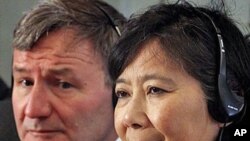The U.S. ambassador to Kabul, Karl Eikenberry, has warned Afghanistan's leaders against criticizing Western efforts to stabilize their country.
Eikenberry said that comments from some Afghan leaders calling the United States occupiers were "hurtful and inappropriate."
In a speech Sunday to students at Afghanistan's Herat University, the outgoing U.S. ambassador said that such comments make it difficult to look relatives of U.S. forces killed in Afghanistan "in the eye and give them a comforting reply" when they ask about the "meaning of their loved one's sacrifice."
Eikenberry did not specifically mention Afghan President Hamid Karzai by name. But last month the Afghan leader warned NATO-led forces not to become an "occupying force" after a series of civilian casualties resulting from coalition airstrikes.
The U.S. envoy said Sunday that when Americans hear themselves being called occupiers, it "offends their pride and makes them lose their inspiration to carry on." He said America has never sought to occupy any nation in the world and that "we serve here as friends."
The United States is preparing to begin withdrawing troops from Afghanistan in July. Afghan security forces are slated to take control of all security operations by 2014.
Afghan and coalition forces continue to face stiff resistance in the Taliban's southern strongholds, as well as in the country's east.
Ambassador Eikenberry said the American people will ask for their forces to come home at the point that "we feel our soldiers and civilians are asked to sacrifice without a just cause, our generous aid programs are dismissed as totally ineffective and the source of all corruption, and your leaders believe we are doing more harm than good."
In his speech, he listed U.S. contributions to Afghanistan, including the construction of new schools, clinics and roads, training of and equipping of Afghan security forces, and investment in the country's agriculture.
Some information for this report was provided by Reuters.
















